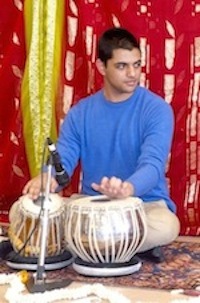Name: Razak Pirani
From: Toronto
Age started studying tabla: 13
Occupation: Student
Music: Hip Hop
1. What inspired you to play/study tabla?
I wasn’t so much inspired; my Mom just told me it would be nice if I learned to play tabla because her family likes to get together and sing. I have a cousin who used to play but then he moved away so I guess I was his replacement. I always enjoyed it, but it was sort of just a hobby initially. My mom used to drive me to class every week but eventually it got to the point where I wanted to do it myself, and I would come to class on my own. I was about 15 or 16 then.
2. What is the most important thing you’ve learned so far?
There isn’t just one thing… there’s patience, discipline, relaxation…
Actually, teaching classes has helped me developed patience, and some sort of sensitivity/people skills; you get some sense of how people are thinking and feeling. You can’t really get mad if the students don’t practice because I remember the times when I hardly practiced and I was lucky that Riteshji didn’t get mad at me.
3. How does tabla affect other parts of your life?
Mostly school, having that daily routine of practicing helps you clear your mind and be a lot more efficient in schoolwork. You don’t notice it until you stop practicing for a while, and then you think, ‘’what’s going on, why am I so stressed all of a sudden?’’ Stress relief is a big factor.
4. Do you have a set time that you practice, if so when?
Usually after dinner, sometime between 10:30 – 12 AM.
5. How do you balance and find time to maintain practice during very busy/turbulent times?
When I’m really busy I might not practice as much as usual, but there’s always some time if you make it. Sometimes you have to force yourself to sit down for a half hour but it almost always pays off.
6. What are some of the biggest hurdles/blocks in your studies of tabla and how do you overcome them?
I find the hurdles are pretty much non existent if you practice consistently. Class will always be challenging, but if you have that routine, along with having a really good teacher, nothing feels insurmountable. Often when practicing, some things get frustrating so then the best thing to do is just bring it to a comfortable speed and work on it for a bit then try to bring it back up. Personally I don’t usually practice at a too comfortable speed, just because I have an hour and I’m determined to make the best of that hour, so I try to push myself. I find that helps long term.
7. What is it like studying with the Toronto Tabla Ensemble and Ritesh Das?
Riteshji is an amazing teacher. He has a lot of experience teaching, he knows exactly how to set a class so it can suit a whole bunch of different kinds of people in it, all at different levels and still get everyone playing to their potential. The environment is very good, everyone is friends with each other, and everyone’s learning so it’s not a competitive environment. Everyone is trying to get better knowing that helping others will in return help you.
8. Do you enjoy performing, do you do anything to prepare before you go on stage?
Performing is fun, it’s not the most important thing for me though. I think that I’m very lucky I don’t have to perform for any reason other than just to have fun and contribute to the organization. I don’t get nervous, there’s a sort of rush you get that can make you a bit shaky, but I think I’m fairly comfortable on stage. I’m not scared really of what other people will think, that ‘s the other thing about having such a good community environment, if you make a mistake, no one’s going to get upset, everyone just laughs it off.
9. What advice would you have to other students looking to grow in their practice?
At the beginning the hardest part is developing some sort of routine, not really how long you practice for. It doesn’t even have to be daily but if most days, there’s a time where you sit and practice, then how much time you put into it will grow I think. I never used to time how long I practiced, I would just start and then there’s a point when you think, “okay I’m done now,” and over time that just gets longer and longer. Overall it’s just consistency; try to find a time of day, start off with maybe 15-20 minutes and it will grow gradually.
10. Where do you see tabla in your life 5 years from now?
For the next 3 years I’m determined to keep up the same commitment I have now, which is coming in for classes or to help teach 3-4 days a week and performing occasionally. But then once I’m done at U of T, it will depend on where I end up going for school after that, if I’m outside Toronto then I won’t be able to have the same involvement, but I’ll still practice and then come to class in the summer. Even if I were to move away, I don’t see any way that I could stop.

No comments